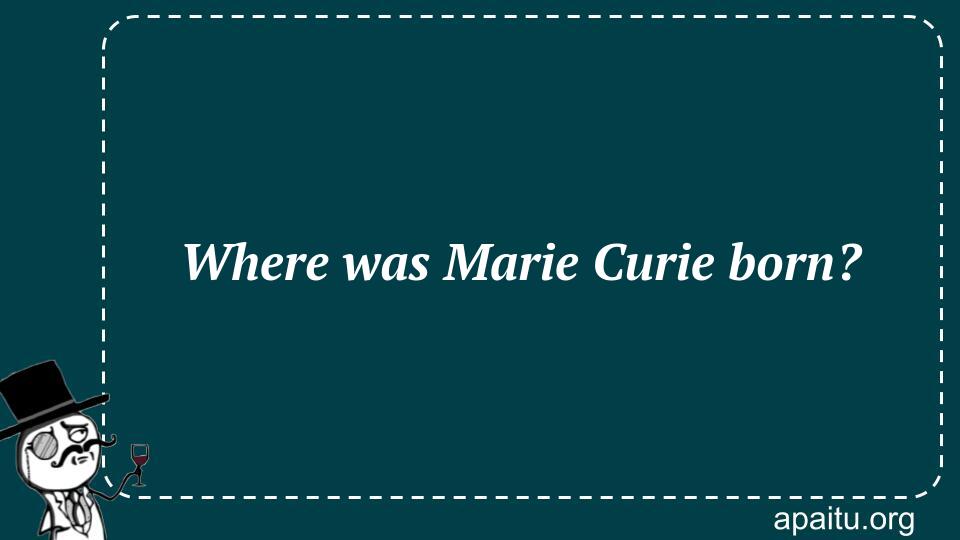Question
Here is the question : WHERE WAS MARIE CURIE BORN?
Option
Here is the option for the question :
- France
- Poland
- America
- Romania
The Answer:
And, the answer for the the question is :
Explanation:
Marie Skodowska Curie, better known as Marie Curie, was born in Warsaw, Poland, in 1867. She was a physicist and chemist. In 1891, she made the trip to Paris in order to enroll in the Sorbonne. It was during her time at the university that she first met her future husband, Pierre Curie. As a result of the couple’s collaborative research on radioactive elements, they were jointly awarded the Nobel Prize in chemistry in 1903. This achievement established her as the first woman to be honored with a Nobel Prize. She became the first person to ever be honored with two Nobel Prizes when she won a second one in 1911.

Marie Curie, one of the most iconic and influential scientists in history, was born in Poland. Her birthplace, Warsaw, holds a significant place in the narrative of her remarkable life and groundbreaking scientific achievements.
Maria Skłodowska, later known as Marie Curie, was born on November 7, 1867, in Warsaw, which was then a part of the Russian Empire. She grew up in a family that valued education and intellectual pursuits, and her early experiences in Poland played a vital role in shaping her passion for scientific exploration.
Curie demonstrated exceptional talent and determination from a young age. She excelled in her studies and displayed a keen interest in physics and chemistry. However, opportunities for higher education were limited for women in Poland at the time, leading Curie to seek further educational prospects abroad.
In 1891, Marie Curie left her homeland and traveled to France to pursue her scientific aspirations. There, she enrolled at the University of Paris, where she would go on to make groundbreaking discoveries in the field of radioactivity. It was during her time in France that she met and married Pierre Curie, a fellow scientist who became her lifelong collaborator.
Marie Curie’s contributions to science were revolutionary. She conducted extensive research on radioactive materials, ultimately isolating two new elements: polonium, named after her native Poland, and radium. Her work not only expanded our understanding of the fundamental nature of matter but also laid the foundation for groundbreaking advancements in medicine, industry, and technology.
In recognition of her extraordinary achievements, Marie Curie became the first woman to win a Nobel Prize. She received her first Nobel Prize in Physics in 1903, jointly awarded with Pierre Curie and Antoine Henri Becquerel, for their groundbreaking research on radioactivity. Later, in 1911, she received her second Nobel Prize, this time in Chemistry, in recognition of her discovery and isolation of radium and polonium.
Marie Curie’s legacy extends far beyond her scientific accomplishments. She shattered gender barriers in the scientific community and paved the way for future generations of women scientists. Her unwavering dedication to her work, intellectual curiosity, and perseverance in the face of adversity continue to inspire individuals worldwide.
Although Marie Curie spent the majority of her adult life in France, her Polish heritage remained an integral part of her identity. Throughout her career, she maintained close ties to her homeland and often visited Poland. Her birthplace, Warsaw, cherishes her memory and celebrates her contributions through various scientific and educational initiatives.
Marie Curie’s impact on the world cannot be overstated. Her pioneering research and unwavering commitment to scientific inquiry have left an indelible mark on the fields of physi